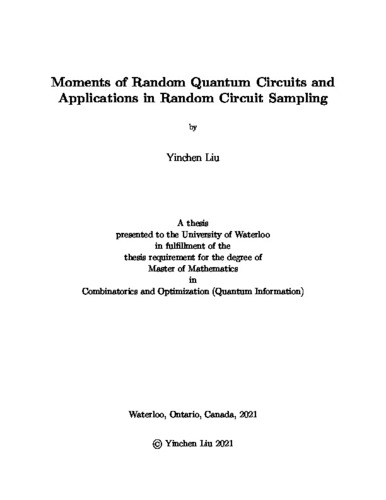UWSpace will be migrating to a new version of its software from July 29th to August 1st. UWSpace will be offline for all UW community members during this time.
Moments of Random Quantum Circuits and Applications in Random Circuit Sampling
| dc.contributor.author | Liu, Yinchen | |
| dc.date.accessioned | 2021-12-23 13:54:26 (GMT) | |
| dc.date.available | 2021-12-23 13:54:26 (GMT) | |
| dc.date.issued | 2021-12-23 | |
| dc.date.submitted | 2021-12-16 | |
| dc.identifier.uri | http://hdl.handle.net/10012/17809 | |
| dc.description.abstract | Random quantum circuits and random circuit sampling (RCS) have recently garnered tremendous attention from all sub-fields of the quantum information community, especially after Google’s quantum supremacy announcement in 2019. While the science of RCS draws ideas from diverse disciplines ranging from pure mathematics to electrical engineering, this thesis explores the subject from a theoretical computer science perspective. We begin by offering a rigorous treatment of the t-design and the anti-concentration properties of random quantum circuits in a way that various intermediate lemmas will find further applications in subsequent discussions. In particular, we prove a new upper bound for expressions of the form E_V[<0^n|V\sigma_p|0^n>^2] for 1D random quantum circuits V and n-qubit Pauli operators \sigma_p. Next, we discuss at a high level the RCS supremacy conjecture, which forms the main complexity-theoretic basis supporting the belief that deep random quantum circuits may be just as hard to classically simulate as arbitrary quantum circuits. Finally, we study the performance of quantum and classical spoofing algorithms on the linear cross-entropy benchmark (XEB), a statistical test proposed by Google for the purpose of verifying RCS experiments. We consider an extension of a classical algorithm recently proposed by Barak, Chou, and Gao and try to show that the extended algorithm can achieve higher XEB scores [BCG20]. While we are unable to prove a key conjecture for random quantum circuits with Haar random 2-qubit gates, we do establish the result in other related settings including for Haar random unitaries, random Clifford circuits, and random fermionic Gaussian unitaries. | en |
| dc.language.iso | en | en |
| dc.publisher | University of Waterloo | en |
| dc.subject | random quantum circuits | en |
| dc.subject | random circuit sampling | en |
| dc.subject | quantum computational advantage | en |
| dc.title | Moments of Random Quantum Circuits and Applications in Random Circuit Sampling | en |
| dc.type | Master Thesis | en |
| dc.pending | false | |
| uws-etd.degree.department | Combinatorics and Optimization | en |
| uws-etd.degree.discipline | Combinatorics and Optimization (Quantum Information) | en |
| uws-etd.degree.grantor | University of Waterloo | en |
| uws-etd.degree | Master of Mathematics | en |
| uws-etd.embargo.terms | 0 | en |
| uws.contributor.advisor | Gosset, David | |
| uws.contributor.affiliation1 | Faculty of Mathematics | en |
| uws.published.city | Waterloo | en |
| uws.published.country | Canada | en |
| uws.published.province | Ontario | en |
| uws.typeOfResource | Text | en |
| uws.peerReviewStatus | Unreviewed | en |
| uws.scholarLevel | Graduate | en |

